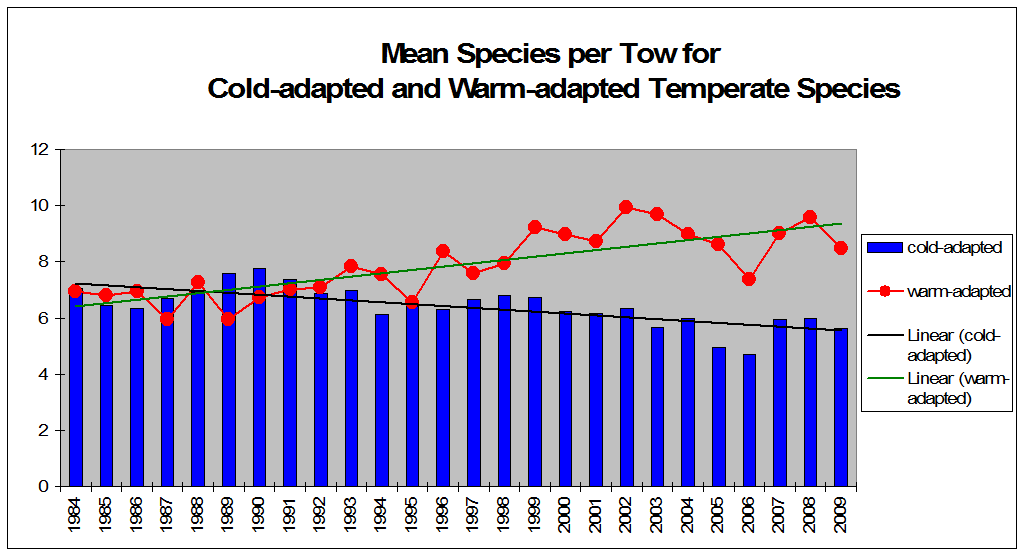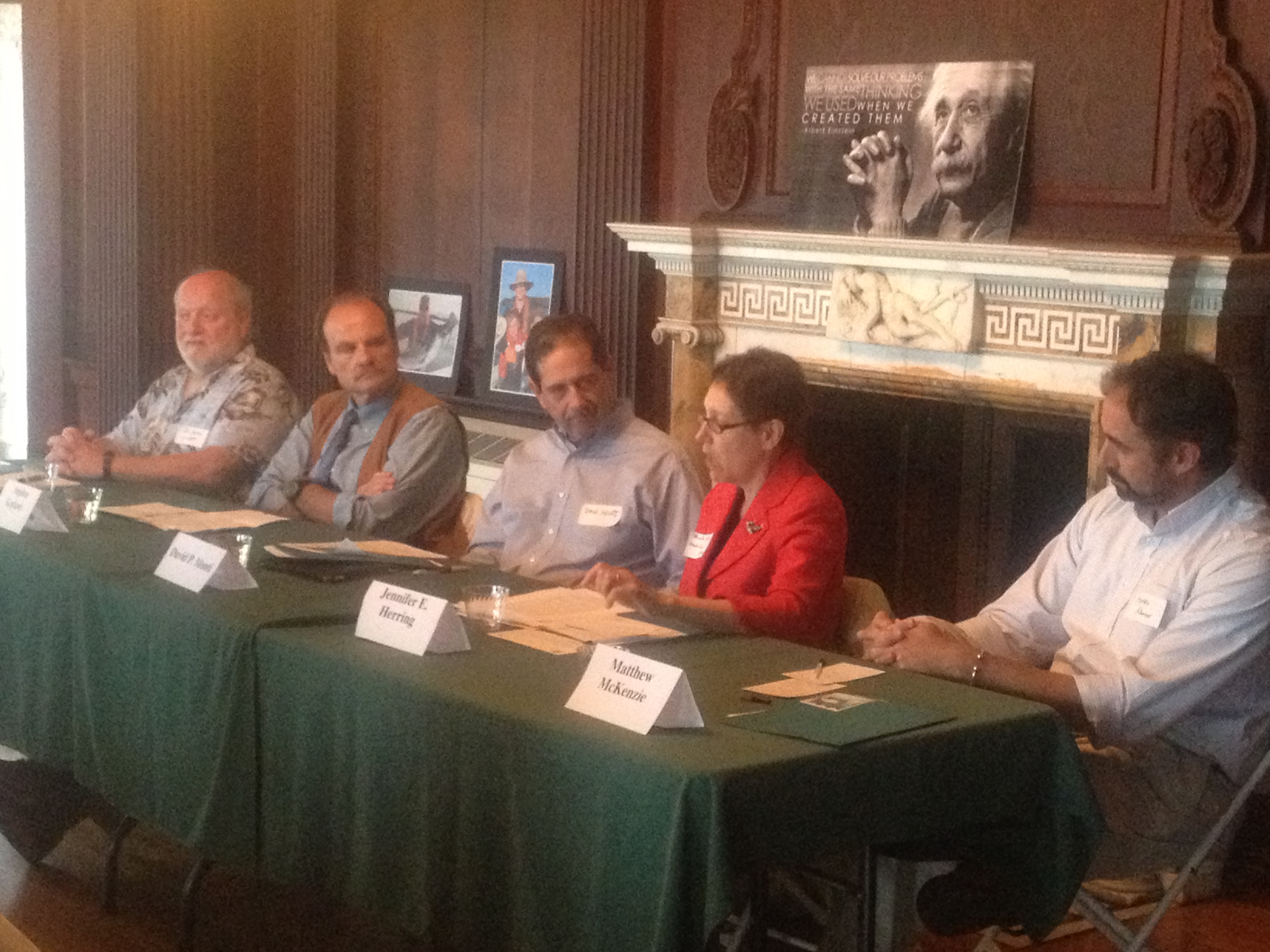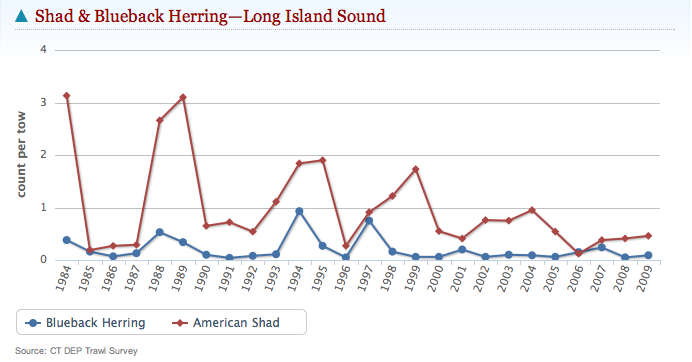Over the last few decades, the fisheries of Long Island Sound and our oceans have seen significant changes.
Oceanwide, herring—the forage fish for so many types of wildlife—are at risk from overfishing and being accidentally killed as bycatch. With the Sound’s water temperature increasing, we’ve seen a decline in cold water species like winter flounder, and an increase in warm water species like striped bass. 
The U.S. has the gold standard for fishery protection, thanks to the law that governs it—the Magnuson-Stevens Act of 1976 (MSA). Since 2000, the law has helped rebuild 34 fish species and strengthened coastal economies around the country. But we have 40 other stocks that need serious help.
So how can we restore our fisheries? We held a forum to find out.
We gathered scientists, fishermen, policy implementers, educators, and advocates at UConn-Avery Point last Thursday to talk about the state of America’s ocean fisheries and how our leaders can stop overfishing, reduce accidental killing of fish, and stop habitat loss. There was consensus that the federal government must act decisively by reauthorizing the MSA.
The panel was moderated by Lee Crockett of The Pew Charitable Trusts in D.C., who leads Pew’s work to reauthorize and strengthen the MSA. Panelists covered a wide range of topics in the two-hour conversation.

Steve Gephard, supervisor of the Diadromous Fish Program and Habitat and Conservation Enhancement Program at Connecticut Department of Energy and Environmental Protection (CTDEEP), said, “In the past, fisheries management plans have emphasized the maintenance of sustainable fisheries without considering the fish populations needed to fully serve their ecological functions. Forage fish species need to be extremely abundant so they not only support fisheries but also support the ecosystems’ food web.”
“If we wish to avoid more fish population crashes in the future, we need to make sure fisheries science is accounting for our full understanding of the ecology of fishes, including the complex interactions between species, the role that habitat plays in sustaining populations, and survival rates of fish that escape from commercial fishing gear,” said Peter Auster, Professor Emeritus of Marine Sciences at UConn-Avery Point and senior research scientist at Mystic Aquarium.
When the public understands what’s at stake, they can speak up in defense of this natural resource, said Jennifer Herring, president and CEO of The Maritime Aquarium in Norwalk: “With a specific, local issue, a growing environmental awareness—among teens, especially—and the effectiveness of social media in spreading a message, the raw ingredients for success are there.”
“New England’s identity and human communities have always been closely tied to the marine trades and especially the abundance of our fisheries,” said Matthew McKenzie, Ph.D., associate professor and American Studies coordinator at UConn-Avery Point.
Ultimately, “Whatever creates an abundance of fish is good for recreational fishing and charter fishing,” says Captain Dave Monti of No Fluke Fishing Charters. “Abundant fisheries enhance the chances of catching a fish (and large ones at that), which is why many people fish recreationally in the first place. In the future I believe we’ll see greater recreational and charter fishing accountability, to not only ensure sustainable fisheries, but to help cultivate abundant fisheries.”
Several participants expressed concern over the Hastings amendment—known as the “Empty Oceans Act” to fisheries advocates—which would do tremendous harm to our nation’s fisheries by allowing catch limits to be based on factors other than the best science we have, limiting public access to fisheries data, and de-emphasizing the placement of neutral observers onboard fishing vessels and at ports.

A common theme in the day’s conversation was the need for ecosystem-based fisheries management. This new approach seeks to maintain healthy forage fish stocks in the food web, reduce bycatch that unnecessarily kills many fish, and foster resilient marine habitats. Audience members were eager to get involved, with many of the questions including suggestions (such as a greater emphasis on recreational catch-and-release) to help out fish stocks in New England.
In addition to hosting discussions, we here at Save the Sound are also digging in—doing our part by removing dams and building fishways that will let some of the at-risk species access their ancestral habitat.
Posted by Sarah Ganong, Media Coordinator at Save the Sound

1 thought on “Sustaining Our Fisheries: Looking at the Big Picture”
Comments are closed.